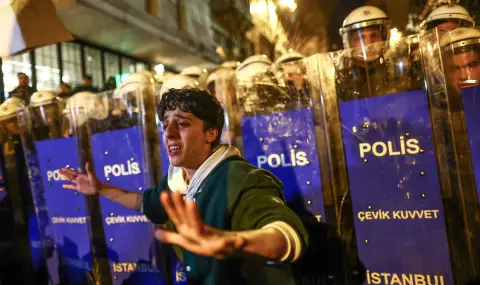Mass protests, political backlash, calls for legislative change and demands for the return of the death penalty have spawned murder in Turkey of an eight-year-old girl, whose body was found after a long search in the southeastern part of the country. The authorities promised to solve the case quickly, and more than 20 people, including the two parents and other close relatives, have been detained so far in connection with the crime, writes BTA.
What exactly happened?
Eight-year-old Narin Guran disappeared on August 21 after getting separated from other children on their way back from a Koran study course. The girl's lifeless body was found 19 days later in a sack by a river about 1.5 km from the village where she lived.
The mayor of Diyarbakır, Murat Zorluoğlu, told a press conference that Narin was first killed, and then her body, placed in a sack, was left in the river bed and covered with branches and stones. Suspicions arose that the little girl might have been killed after a sexual spat. Narine was buried yesterday in the absence of her parents, amid violent public reactions and protests.
The investigation
24 people were detained in the case, including Narin's mother, her father, her older brother, four uncles and one of her aunts, the website Bianet wrote. As part of the investigation, before Narine's body was found, around 150 vehicles were checked in traffic. Houses in the village were searched, cars were searched, statements were taken from 130 people, more than 11,000 acres of land were searched with the help of 7 dogs.
The main suspect is one of the uncles - Salim Guran, detained as part of the investigation, who was placed under arrest on charges of "intentional murder" and "imprisonment". The Minister of the Interior, Ali Yerlikaya, said on the occasion of the death of little Narin, that he expects the case, which has saddened Turkey of 85 million people, to be resolved quickly, because "everyone wants justice to be served". President Recep Tayyip Erdoğan promised that justice would prevail and assured that he would personally monitor the trial so that the guilty "receive the severest punishment they deserve".
Why did the case cause such a stormy response?
On the day of Narin's funeral yesterday, public protests and demonstrations took place in many places in Turkey, including the capital Ankara. Protesters chanted "We are not afraid, we will not be silent", raised anti-government slogans as well as slogans against Islamist sects.
Human rights organizations in Turkey point to growing conservatism in the country as a contributing factor to these tragedies, notes journalist Murat Yetkin of "Yetkin Report" in his material on the subject. Women's rights groups say that some actions by President Recep Tayyip Erdogan's ruling Justice and Development Party (AKP), such as withdrawing from the Istanbul Convention and other policies, have created an environment in which vulnerable groups are exposed to all greater risk, he also writes.
Yetkin quoted in his material Fidan Atasselim, secretary general of the platform "We will stop the killing of women", which criticized the government's family-oriented policies: "You constantly put family-oriented policies on the agenda. This is your family! Where is the woman? The woman has no name! where is the child The child has no name!".
Many protesters also blame Turkey's system of religious sects and communities and the resulting ultra-conservative mentality. Claims were also cited in the media that those responsible for Narin's death were linked to a Turkish religious sect.
The Turkish Communist Party declared against "AKP's Turkey", wrote the left-wing edition "Sol". "The killer of Narin is the sectarian system," read a slogan raised at a protest rally yesterday. Betul Aksu from the organization "Women's Solidarity" stated, quoted by the Turkish section of Deutsche Welle, that in the first eight months of the year a total of 11 children were killed in Turkey and at least 101 children were abused. The organization spoke out against government policies on the family. "In the families you call "sacred", where you try to keep women and children as if in a prison, there is violence and abuse," said Seval Karabulut from the platform "We will stop the killing of women".
Another activist criticized the placing of a bridal veil on the girl's coffin. "If this child were alive, he would be starting school today. She would carry an apron, a bag, pencils. To put a bridal veil on the coffin - that's your mentality,'' Tülin Osmanogullar said, as quoted by Deutsche Welle. Family and Social Welfare Minister Mahinur Özdemir Göktaş, meanwhile, promised that the ministry would engage in the case and "do everything possible to ensure that the person or persons who took Narin's life receive the harshest punishment." .
Bring back the death penalty?
Currently, the most severe sentence in Turkey is life imprisonment under a strict regime. The tragedy with little Narin, however, brought back to the country's agenda the topic of restoring the death penalty, which was abolished in 2004, during the first term of Erdogan's government.
Fatih Erbakan, leader of the New Prosperity Party (PND), made a public statement demanding the reinstatement of this type of sentence, stressing the need for "serious legal reforms". In his words, "the death penalty should be discussed again in the Parliament of Turkey" in order to respond to such horrific crimes as the murder of eight-year-old Narin, wrote "Turkiye Today".
Erbakan's calls were supported by other political figures such as the leader of the Great Union Party. Mustafa Destigi, who called on the authorities to reintroduce the death penalty to punish those responsible for heinous acts such as this murder, added the same publication. Since Turkey abolished the death penalty in 2004, the debate over its reinstatement has resurfaced many times.
